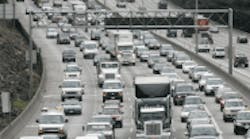It’s inevitable, I suppose, that truckers yet again are getting blamed by motorists for all the traffic congestion out there on our roadways – even though, of course, they are vastly outnumbered by the very motorists who are doing all the blaming.
That, at least, is my take after leafing through the latest America THINKS survey compiled by infrastructure consulting firm HNTB Corp.
Conducted by Kelton Research for HNTB back in late May, this online survey polled a random nationwide sample of 1,000 Americans aged 18 and up to gauge their feelings about highway congestion, what causes it, and whether they’d be accepting of more roadway tolls ... if such tolls would help reduce congestion.
Not surprisingly, HNTB’s survey found many Americans are bothered by the condition of their highways, with slightly more than one in two of those polled (54%) having a problem with the poor road conditions, half (50%) saying these byways are too jammed, and 46% in particular believing there’s excessive traffic in urban areas.
Ah, but what gets the blame for this situation? An aging, inefficient highway system “clogged,” in the words of survey participants, with “slow moving” trucks. HNTB’s poll found that more than one-third (38%) of Americans are “distressed” by having to share lanes with large trucks, 25% think there aren't enough lanes, and one-quarter (25%) believing that dedicated lanes required for large trucks would make the biggest difference in reducing traffic or bettering efficiency of freight delivery.
That’s all fine and dandy … except for this other problem: there are FAR more cars on our highways than trucks.
Just take a look at vehicle registration data compiled by the U.S. Department of Transportation. For 2008, the most recent year available, it shows over 6.7 million trucks and 2.2 million tractor-trailers in operation on U.S. roads, with some 843,000 buses thrown in for good measure.
Sounds like a lot … until you notice more than 137 million cars are out there as well – which is well over 10 times the size of the truck population.
[Below is an example of how Stockholm, Sweden, dealt with this problem – by charging everyday motorists “congestion fees.” It’s a toll of course – so the question is, would U.S. drivers go for it?]
Heck, there are over 7.7 million motorcycles out there, too, which is only a million units short of the truck and tractor-trailer population COMBINED.
Let’s also not forget that most sanguine of facts, either: trucks carry over 70% of our nation’s freight. You don’t like trucks? That’s fine, but don’t go to the grocery store or shopping mall expecting to find anything.
Oh, wait, you think we can throw all that freight back onto the railroads? OK, but don’t forget you’ve got to get the freight to and from the rail depot, you know – trains don’t roll right up to the grocery store, or to your house to deliver that sweater you ordered online.
Don’t forget, too, what happens when the power goes out during a storm – those utility crews (God bless them) aren’t relying on the “horse-and-buggy” to race out and repair downed electrical lines. Nor do you see relief supplies getting hauled into places devastated by natural disasters, such as Hurricanes, in the backs of Conestoga wagons or compact cars.
So while traffic congestion remains a big – and growing – problem on our highways, let’s refrain from placing the blame just on trucks. There are 137 million other reasons out there for highway congestion, too, you know.



